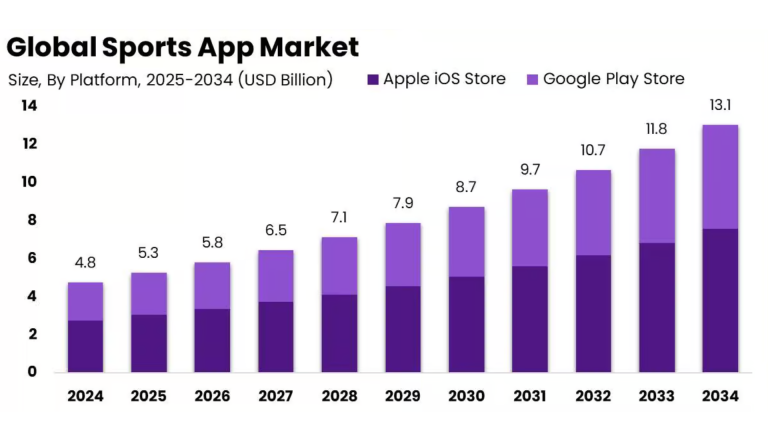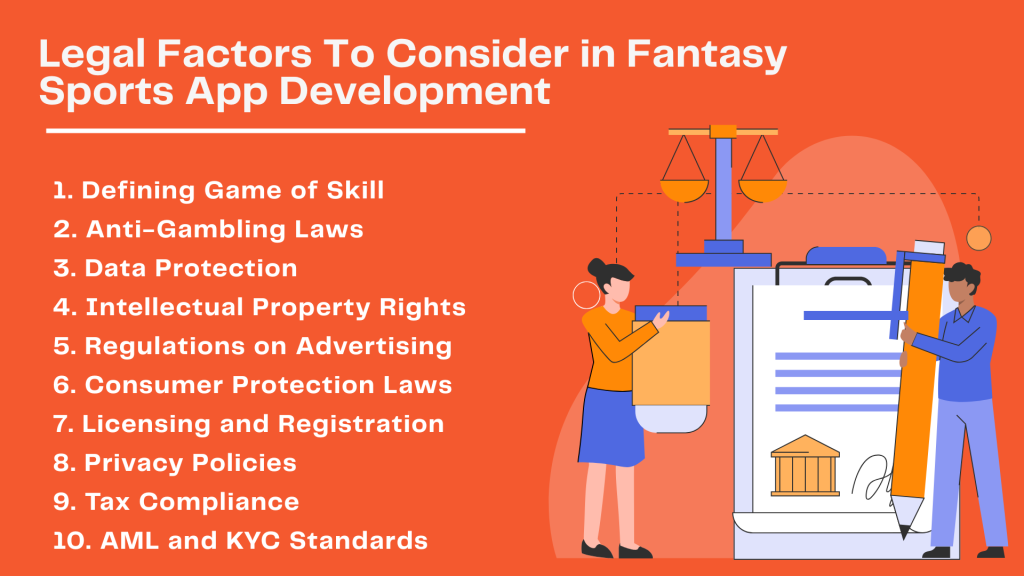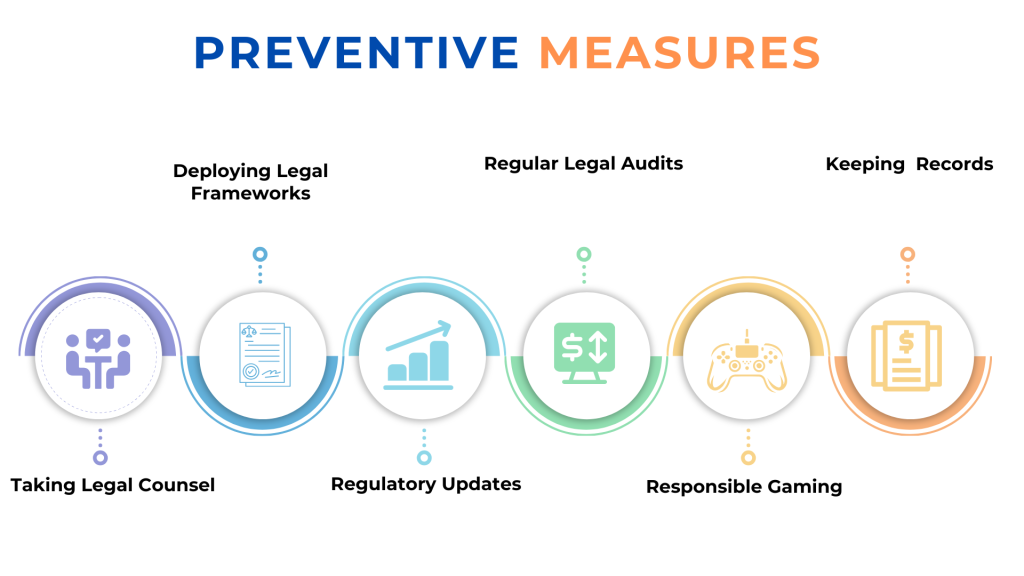
Summary:
This blog describes that legal Compliance is vital when developing fantasy sports apps. It guarantees conformity with gaming licenses, data protection regulations (such as GDPR/CCPA), and gambling laws. Compliance guards against legal threats, data loss, and damage to reputation, besides establishing users’ trust. Compliance also facilitates long-term scalability and growth, thus, legal frameworks are a requirement for effective app development.
The thrill of selecting your ideal team, strategizing best player matchups, and fighting for bragging rights has turned fantasy sports into a mass phenomenon. Millions of fans play on these sites, transforming ordinary spectators into team managers from their living room couches. Yet behind the entertainment and seamless experience is a complex realm of legal regulations that fantasy sports app creators need to tread. Disregarding these regulations may result in huge fines, destroy your brand’s reputation, and close your site permanently.
This in-depth guide explores the important areas of legal compliance in fantasy sports app development. We will look at the most important legal considerations, deconstruct the intricacies of various jurisdictions, and deliver practical advice to help your app stay within the law. Whether you’re a new start-ups or a development company entering the thrilling realm of fantasy sports, knowing these legalities is essential for long-term success.
Understanding the Legal Framework

The legal status of fantasy sports has been the subject of significant debate and scrutiny worldwide. In contrast to the traditional sports bet, where one may often bet on the result of actual games being played, fantasy sports are typically regarded as games of skill. Players create virtual teams represented by actual players and gain points based on the statistical performance of the players in actual games. This element of skill has been a significant discriminator in most legal systems.
As per the reports by the sports app market, the worldwide market for sports apps is experiencing a great expansion and is anticipated to grow to approximately USD 13.1 billion by 2034 from USD 4.77 billion in 2024. This remarkable increase demonstrates a steady compound average annual growth rate (CAGR) of 10.6% from 2025 to 2034.
In 2024, North America was in the lead with market share, reporting more than 36% of the world’s total revenues of approximately USD 1.71 billion. The United States accounted for most of this, with an estimated market value of USD 1.62 billion. The U.S. market is set to rise steadily by a CAGR of 8.4% in the next ten years. We hope these reports help you gain interest in creating your app. If you have any more questions, read the blog on how to make a sports betting app to understand in detail.
The distinction between a game of skill and one of chance is frequently indistinct, and the laws differ sharply by country, state, and even province. What would be completely legal in one region may encounter severe limitations or an outright ban in another. This fragmentation by jurisdiction is a major hurdle for fantasy sports app developers to create an app within the legal framework’s boundaries.
The legal landscape is always evolving. Connect with the Fantasy App Developer to receive crucial insights and ensure your app remains compliant.
Legal Factors in Fantasy Sports App Development
Several key legal considerations must be given special attention in the creation and operation of a fantasy sports app. They include:

1. Defining "Game of Skill" vs "Game of Chance
This is the most basic legal issue. Most, if not all, jurisdictions that allow fantasy sports do so on the basis that they are primarily games of skill. This determination usually rests on considerations such as:
- Statistical Analysis: The degree to which success is dependent upon players’ awareness of their statistics, team stats, and wise drafting.
- Player Knowledge: How being aware of player roles, matchups, and potential relates to performance.
- Active Management: The user’s capability to execute in-season roster manipulation, trades, and strategic plays that affect the performance of their team.
- Randomness: The extent to which the outcome is affected by chance or random occurrences beyond the natural fluctuation of real-life sports.
Fantasy sports app developers must make their platforms and rules present the skill-based aspects in the clearest way possible. Features such as in-depth player statistics, historical data, expert analysis incorporation, and active roster management features can strengthen the case for skill dominance.
2. Anti-Gambling Laws and Regulations
Even if classified as games of skill, fantasy sports can still fall under the purview of anti-gambling laws if they involve the exchange of money or other valuable prizes. Many jurisdictions have specific regulations regarding online gaming and wagering. Developers must ensure their platform complies with these laws, which may include:
- Licensing and Permits: Acquiring required licenses to run a fantasy sports site in particular jurisdictions.
- Age Verification: Using strong age verification mechanisms to ensure that minors are not engaged in paid contests.
- Geofencing: Limiting access to users in jurisdictions where paid fantasy sports are illegal.
- Fair Play and Transparency: Preserving the integrity of competitions, avoiding fraud and collusion, and ensuring transparent rules and prize structures.
- Responsible Gaming Measures: Having mechanisms that ensure responsible gaming, including deposit limits, self-exclusion, and referral to problem gambling resources.
3. Data Protection and Privacy
Fantasy sports apps harvest lots of user data, such as personal data, financial data (in case of paid games), and activity related to gameplay. Adherence to data privacy laws such as GDPR (General Data Protection Regulation), CCPA (California Consumer Privacy Act), and other regional legislations is important. The developers need to:
- Apply Strong Security Features: Safeguard the user data against unauthorized use, break-ins, and internet attacks.
- Get Explicit Consent: Explicitly inform users of data being gathered, the purpose for which it will be used, and get their explicit consent.
- Offer Data Access and Control: Provide users access to, alter, and erase their private data.
- Ensure Transparent Privacy Policies: Clearly define data collection methods, use, and sharing policies in a readable format.
4. Intellectual Property Rights
Fantasy sports applications tend to use sports data, player names, logos, etc., which are intellectual property. Developers need to ensure that they have the rights and permission to legally use this content. This includes:
- Data Licensing Agreements: Purchasing licenses from sports leagues, data suppliers, and players’ associations.
- Trademark and Copyright Compliance: Honoring trademarks and copyrights of team names, logos, and other brand elements.
- Avoiding Infringement: Ensuring that the design, features, and content of the app do not infringe on the intellectual property rights of others.
5. Regulations on Advertising and Marketing:
Advertising a fantasy sports app is subject to advertising and marketing regulations that may differ across jurisdictions. This includes:
- True Advertising: To ensure that any marketing material used is accurate and not deceptive.
- Platform Policy Compliance: Complying with app stores’ advertisement policies (such as Apple App Store and Google Play Store) and social media platforms.
- Restrictions on Gambling Advertisement: Being cautious regarding rules about advertising for gambling-related activities, even though fantasy sports are games of skill.
- Responsible Advertising: Refraining from advertising to vulnerable people or making impractical guarantees of winning.
6. Consumer Protection Laws
Developers of fantasy sports apps are also subject to general consumer protection laws to ensure equitable and transparent business interactions with users. These include:
- Clear Terms and Conditions: Offering users clear, concise, and easily accessible terms of service.
- Fair Contest Rules: Setting up clear and impartial rules for all contests.
- Efficient Customer Support: Offering sufficient avenues for users to get help and resolve complaints.
- Refund and Withdrawal Policies: Maintaining consistent and equitable policies for refunds and cashing out of winnings.
7. Licensing and Registration
While there isn’t a centralized licensing body for fantasy sports in India, playing in some states might involve procuring certain licenses. For example, sites playing in Nagaland have to procure a license under the Nagaland Prohibition of Gambling and Promotion and Regulation of Online Games of Skill Act, 2016. Proper licensing becomes an essential aspect to evade legal consequences.
8. Terms of Service and Privacy Policies
Clear and detailed Terms of Service (ToS) and Privacy Policies are essential. These policies should outline:
- Eligibility requirements (e.g., minimum age, geographic area)
- Game rules and mechanics
- Distribution of winnings and taxes
- User data collection, storage, and security measures
Transparency on these matters instils user trust and provides legal safeguards.
9. Tax Compliance
Fantasy sports websites have to comply with tax laws:
- Goods and Services Tax (GST): An 18% GST is levied on platform incomes.
- Tax Deducted at Source (TDS): Winnings over ₹10,000 are taxed at a 30% TDS under Section 194B of the Income Tax Act.
Compliance with taxes must be followed to prevent penalties and ensure operational legitimacy.
10. Anti-Money Laundering (AML) and Know Your Customer (KYC) Standards
To avoid financial crimes, fantasy sports sites are required to implement AML and KYC measures. This involves authenticating the user identity, tracking transaction activity for suspicious behavior, and reporting when required.
Jurisdiction Differences Globally
As noted above, the regulatory landscape for fantasy sports is far from one-size-fits-all. Makers targeting a global or multi-region user base must deal with the daunting task of learning and complying with the unique regulations of each target jurisdiction. This can include:
- Performing Detailed Legal Research: Hiring lawyers in each target jurisdiction to learn about the local laws and regulations.
- Enforcement with Geolocation Technologies: Employing GPS and IP address detection to limit access to users who are within restricted areas.
- Tailoring App Features and Content: Modifying app features, contest structures, and marketing materials to meet local requirements.
- Acquiring Local Licenses: Requesting and obtaining required licenses to operate within particular areas lawfully.
Example: In a few US states, DFS has been specifically legalized and regulated, while in others, its legality is ambiguous or banned. Likewise, laws in Europe vary considerably from one country to another. To learn about European laws, check our guide and understand European laws on fantasy sports in detail.
Importance Of Legal Regulations In Fantasy Sports App Development
The rise in popularity of fantasy sports app development has created new opportunities for sports fanatics and business people alike. Yet, with innovation and passion comes a major challenge: legal compliance in fantasy sports. Legal frameworks and understanding are equally important for the compliance of the app, as well as for long-term success and integrity in the industry, which is growing rapidly.
1. Establishes Game Legality (Skill vs. Chance)
Legal laws assist in categorizing fantasy sports as a game of skill, which is critical to distinguish them from gambling and conduct business legally in different regions.
2. Ensures Regional and Global Compliance
Various jurisdictions have established laws to regulate fantasy sports sites. Complying with the laws ensures seamless app functioning within states or nations.
3. Safeguards User Information and Privacy
There is a need to adhere to data protection regulations such as GDPR and CCPA in fantasy sports app development to protect personal and financial user data.
4. Needs Licensing and Permits
Purchasing the requisite fantasy sports licenses guarantees that your site is approved for operation, minimizing the chances of bans or legal repercussions.
5. Encourages Fair Play and Anti-Fraud Practices
Regulations impose equitable play policies and anti-fraud system integration to provide a secure and reliable gaming environment.
6. Establishes Trust and Business Integrity
A lawfully compliant fantasy sports application gains user confidence, investor attention, and brand credibility for future growth.
Preventive Measures towards Legal Compliance

Legal compliance is not a one-time activity but a recurring process. The developers of fantasy sports apps should be proactive and pursue the following:
- Taking Legal Counsel: Hiring seasoned legal experts who specialize in online gaming and sports law at the outset of the development process.
- Deploying Strong Compliance Frameworks: Incorporating legal and regulatory needs into the app’s design, development, and processes of operation.
- Maintaining Up-to-Dateness with Regulatory Updates: Regularly tracking developments in the laws and regulations of all target jurisdictions.
- Carrying out Regular Legal Audits: Regular review of the app and how it operates to maintain continued compliance.
- Urgent User Protection and Responsible Gaming: Taking steps to secure users and ensure responsible play.
- Keeping Comprehensive Records: Keeping records of user data, transactions, and compliance activities accurately.
Simplify your legal journey for creating a fantasy sports app. Connect with our experts and ensure you’re covering all critical compliance bases.
Cost Faced Due To Avoidance Of Legal Compliance
Non-compliance with the law may result in serious repercussions for fantasy sports mobile app developers, such as:
- Heavy Fines and Penalties: Regulators may levy heavy fines for illegal operation.
- Legal Action and Litigation: The developers can be sued by regulatory bodies or impacted users.
- Reputational Harm: Publicity about illegal actions can critically harm the app’s reputation and user confidence.
- App Store Removal: The app stores can eliminate non-compliant apps from their stores.
- Criminal Charges: In certain instances, running an illegal gambling website can be a criminal offense.
- Business Shut Down: Ultimately, non-compliance may result in the shutdown of the fantasy sports app.
How a Fantasy App Developer Supports Legal Compliance and Scalable App Development
For your fantasy app development business, being legally compliant is imperative. It protects against lawsuits, fines, and reputational loss by maintaining compliance with gambling legislation, privacy of data, and consumer protection across different jurisdictions. This creates trust and enables long-term growth.
For a Fantasy App Developer, integrating legal compliance in fantasy sports app development is not a choice, but a necessity. Their strong legal framework guarantees your site operates within multiple jurisdictional borders as a game of skill, with protection for user data, and averted heavy penalties that may immobilize your company’s prospects and reputation
Conclusion
The fantasy sports universe is full of opportunities for innovation and expansion. Yet, it is important to navigate the intricate legal environment to establish a viable and prosperous platform. Through knowledge of the central legal concerns, awareness of jurisdictional variations, and a proactive compliance posture, fantasy sports app developers can provide users with interesting and fun experiences and do so within the limits of the law.
Spending money on legal advice and keeping compliance as a priority from the very beginning is not only about risk management; it’s an essential aspect of creating a reliable, credible, and enduring fantasy sports application that can survive in the ever-changing realm of online gambling. Keep in mind, playing by the book makes everyone a winner in the long term.
Frequently Asked Questions
The largest hurdle is proving your app is a “game of skill” instead of chance in each jurisdiction. Overcome this by structuring features that prioritize user knowledge, statistical analysis, and strategic decision-making, and extensively documenting how skill outweighs luck in your game mechanics.
No, it’s not sufficient. If your app is available in other countries or even other states/provinces, you’ll have to comply with their local laws covering online gaming, data privacy (such as GDPR if you have European users), and consumer protection. Geofencing and localized legal counsel are essential.
Fantasy sports apps gather vast user data (personal details, financial information, gameplay). GDPR and CCPA require open data collection, express user permission, strong security practices, and the ability of users to view or erase their data. Failure to comply can result in huge fines.
The kind of license for a fantasy sports app would vary according to the jurisdiction and local laws. Generally, in most cases, a skill-based gaming license is required to operate lawfully since most areas consider fantasy sports as games of skill and not by chance. Also, you can be required to obtain permission from local gaming authorities and have to adhere to data privacy laws (such as GDPR or CCPA) and consumer protection acts. Gambling licenses are sometimes mandated if real money bets are involved in a country. Be sure to check local laws for compliance and avoid fines.
Immediate consequences include large fines, being removed from app stores (Apple App Store, Google Play), lawsuits, serious reputational harm, and even criminal prosecution in some extreme situations. These can result in substantial financial losses and even force your business to shut down.



